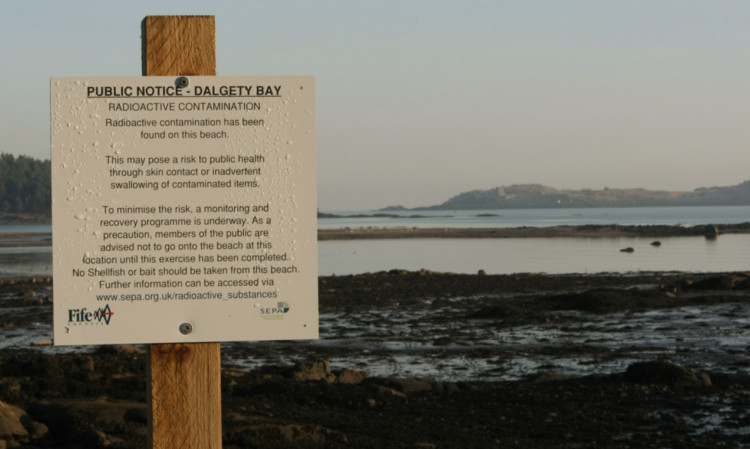The Ministry of Defence (MoD) has confirmed plans to clean up radioactive particles at Dalgety Bay.
Recent investigations at the site identified possible health risks through skin contact or ingestion of the material at the Fife beach and urged the clean-up to be stepped up.
The particles are thought to date back to instruments from Second World War aircraft dumped at the site.
The work will include removing the particles from the beach, building a wall and slipway to prevent other radioactive material from reaching the area and replacing and extending “coastal rock armour”.
The MoD said work should start later this year subject to permission and is expected to be phased until 2018.
The report does not specify costs but local MP and former Prime Minister Gordon Brown, believes the clean-up will cost around £10 million.
“After three years of intensive campaigning, including four debates in the House of Commons, I welcome the Ministry of Defence agreement today to spend what I believe will be £10 million to clean up the pollution caused by radiation at Dalgety Bay,” he said.
“The pollution resulted from dumping 800 wartime planes with radiated dials and other hazardous equipment into the sea. Subsequent coastal erosion that has brought the pollution to the surface.
“I am satisfied that the Ministry of Defence is going to fund the clean-up costs. At the same time I want an accelerated timetable so we don’t have to wait another four years before the pollution is removed and we are satisfied that the risks have been dealt with.”
The Scottish Environment Protection Agency (Sepa) welcomed the report.
Executive director Calum MacDonald said: “The proposed works outlined today by MoD provide a long term solution to the radium contamination of Dalgety Bay which if successful will allow the public to use the entire area again in an unrestricted manner.
“We welcome the proposals and will continue to work with MoD, Fife Council and other partners as detailed plans for the works are developed and implemented. If these works are completed successfully SEPA considers that this will allow the closure of this long running issue”.
Dr Richard Dixon, director of Friends of the Earth Scotland, said it is not a “complete solution” but praised the local community for their campaigning.
“It is great that the MoD have finally stopped denying responsibility and come up with a plan to deal with the mess they caused at Dalgety Bay,” he said.
“This is not a complete solution because some radioactive waste will be left entombed on site but it should finally put an end to the danger faced by humans and wildlife in what should be one of Scotland’s more attractive seaside spots.
“All credit to the local community and to SEPA for their dogged persistence in getting the MoD to finally do the right thing. The next challenge will be getting them to pay for it all and to do it properly.”
